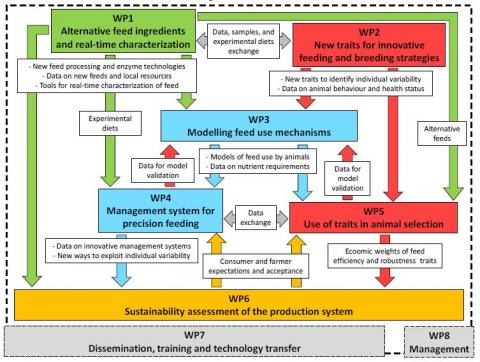Work plan
 Feed-a-Gene is composed of six Research and Innovation work packages (WP) (each of them including the demonstration of the technologies developed), one Dissemination WP and one Management WP. All WPs are linked to each other and results from some will be used by others. All WPs will operate from the start to the end of the project to take full advantage of the duration of the project. To facilitate the start of the project, some WPs will use existing data and models and will implement the results generated by the project at a later stage when they become available. This ensures that if one WP encounters a delay, the work planned in the rest of the project will not be compromised.
Feed-a-Gene is composed of six Research and Innovation work packages (WP) (each of them including the demonstration of the technologies developed), one Dissemination WP and one Management WP. All WPs are linked to each other and results from some will be used by others. All WPs will operate from the start to the end of the project to take full advantage of the duration of the project. To facilitate the start of the project, some WPs will use existing data and models and will implement the results generated by the project at a later stage when they become available. This ensures that if one WP encounters a delay, the work planned in the rest of the project will not be compromised.
- WP1 will develop novel feeds, feed processing, and enzyme technologies to better use local resources including oilseed meals, green biomass and by-products after the extraction of protein from green biomass. It will identify and quantify the impact of feed processing and novel enzyme technologies on the nutritive value of feeds. It will also develop new tools for realtime analysis of chemical composition and nutritional values of feeds.
- WP2 will develop new animal traits to monitor feed efficiency, robustness and welfare in different species, and to identify individual diversity and variation over time. This will allow developing tools for the real-time control of animal status and for improved selection strategies. Strong interactions with WP1 will allow to better characterise digestibility and efficiency of different feeds.
- WP3 will model biological functions with emphasis on feed use mechanisms. It will develop mechanistic mathematical models of nutrient use during growth and reproduction. These models will then be used to predict variation in nutrient requirements over time and among individuals. Data on feed characteristics from WP1 and new traits developed in WP2 will be used in WP3.
- WP4 will develop management systems for precision feeding to increase resilience to fluctuating environments and conditions in different productions systems. This includes the development of monitoring and decision support tools, controlling software and hardware, and precision feeder devices. The management systems developed will combine real-time characteristics of feeds (from WP1), animals and the environment (from WP2 and WP5) with nutritional models (WP3).
- WP5 will evaluate animal traits developed in WP2 for genetic selection purposes. This includes the development of genetic models to better use these traits for selective breeding (e.g., by linking crossbred performance to purebred breeding animals), and to identify genetic components of the animals’ sensitivity to environmental conditions. Traits and models linked to feed efficiency and robustness will allow proposing breeding schemes to select animals more adapted to environmental fluctuations in the long term. Information from new feeds from WP1 and feed efficiency and nutrient requirements models from WP3 will be used in WP5.
- WP6 will perform a sustainability assessment of the different production systems considered taking into account the implementation of innovations proposed by the different WPs. It will include a generic assessment based on statistical data sets available in Europe, and a more specific assessment of case studies based on the demonstration sites selected in the project. WP6 will also investigate farmer expectations and consumer acceptance of the new technologies and alternative production systems proposed to provide feedback to the five first WPs.
- The Dissemination WP (WP7) ensures that results of the project are adequately transferred to relevant stakeholders. This will be done using various tools ranging from a website to scientific publications and conferences, through the organisation of targeted events such as training workshops or demonstration days targeted to key stakeholders.
- WP8 will encompass all management tasks relevant to the implementation of the project. This includes setting up of a secured extranet website dedicated to the project, organising annual and committee meetings, preparing the periodic reports for the EC, managing financial and administrative issues, risks, and intellectual property issues.